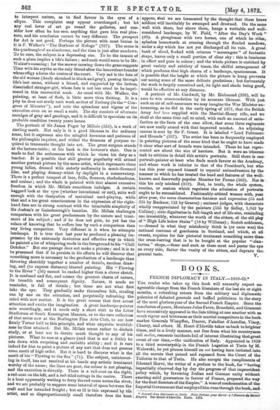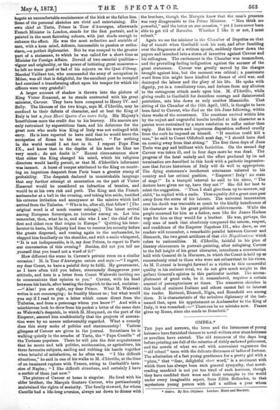BOOKS.
FRENCH DIPLOMACY IN ITALY.-1859-62.5 Tug reader who takes up this book will naturally expect an agreeable change from the French literature of the last six or eight- months, a refreshing return from the military and diplomatic- polemics of defeated generals and baffled politicians to the story of the most glorious year of the Second French Empire. Since the conclusion of peace, Messieurs Jules Fevre, Benedetti, and Gramont have successively appeared in the lists tilting at one another with as- much vigour and bitterness as their martial competitors in the book.. market Generals Wimpffen, Dncrot, Paladine d'Aurelles, Vinoy,. Chanzy, and others. M. Henri dideville takes us back to brighter times, and in a lively manner, not free from what his countrymen. call malice, recounts incidents full of interest illustrating that great event of our time,—the unification of Italy. Appointed in 1859• to a third secretaryship in the French Legation at Turin by M. Walewski, he yet plumes himself on not having been initiated into- all the secrets that passed and repassed from the Court of the- Tuileries to that of Turin. He also accepts the compliments of Edouard nerve, the writer of a preface to the book, for "having impartially observed day by day the progress of that improvident- policy which, by favouring Italian and German unity withont exacting solid guarantees in favour of France, prepared the way for the final disasters of the Empire." A tone of condemnation of the Imperial Government that employed him runs through the book, and * Journal dun Diplosnate en Italie. Notes Intimes pow• Servir a fHueoire dK Beton&
Empire. Par Henri d'Idaville. Paris. 1872.
begets an uncomfortable reminiscence of the kick at the fallen lion. Some of the personal sketches are vivid and entertaining. His own chief at Turin, Prince la Tour d'Auvergne, afterwards French Minister is London, stands for the first portrait, and is painted in the most flattering colours, with just shade enough to enhance the effect. He was the most seductive and amiable of men, with a keen mind, delicate, inaccessible to passion or enthu- siasm,—a perfect diplomatist. But he was unequal to the greater part of a statesman, to which he was called for a short time as Minister for Foreign Affairs. Devoid of two essential qualities— vigour and originality, or the power of initiating great measures— he left no trace good or bad of his sojourn on the Quai d'Orsay. Marshal Valliant too, who commanded the army of occupation in Milan, was all that is delightful, for the excellent post he occupied had exercised a transforming effect upon his temper for which his officers were very grateful!
A larger amount of shadow is thrown into the picture of King Victor Emanuel, as he stands contrasted with his great minister, Cavour. They have been compared to Henry IV. and Sully. The likeness of the two kings, says M. d'Ideville, may be confined to their defects of character, and at best the King of Italy is but a faux Henri Quatre (run autre Sully. His Majesty's boastfulness mars the credit due to his bravery. His amours are only restrained by superstitious fears, and his deference for the great men who made him King of Italy was not untinged with -envy. He is here reported to have said that he would leave the -occupation of Rome to his son Humbert. " For nothing in the world would I set foot in it. I respect Pope Pius IX., and know that in the depths of his heart he likes me very much ; do not doubt it." Recent circumstances show that either the King changed his mind, which his religious directors would hardly permit, or that M. d'Ideville's informant was inexact. A burst of temper attributed to the King on receiv- ing an imperious despatch from Paris bears a greater stamp of probability. The despatch declared in unmistakable language that any further attempt at annexation on the part of Victor Emanuel would be considered an infraction of treaties, and would be at his own risk and peril. The King met the French ambassador at a ball in the evening, and taking him aside, testified his extreme irritation and annoyance at the missive which had arrived from the Tuileries. " Who is he, after all, that fellow ?
-original word is of much coarser coinage.] The latest arrival among European Sovereigns, an intruder among us. Let him remember, then, what he is, and also who I am ! the chief of the -first and oldest race that reigns in Europe." Quitting his inter- locutor in haste, his Majesty had time to recover his serenity before the guests dispersed, and coming again to the ambassador, he clapped him familiarly on the shoulder, and with a smile whispered, It is not indispensable, is it, my dear Prince, to report to Paris our conversation of this evening ? Besides, did not you tell me yourself that you heard not a word of it?"
How different the scene in Cavour's private room on a similar -occasion ! M. la Tour d'Auvergne enters and says :—" I regret, my dear Count, to have a painful duty to fulfil. My government, as I have often told you before, strenuously disapproves your attitude, and here is a letter from Count Walewski inviting me to communicate that opinion to you." Cavour, with his head between his hands, after hearing the despatch to the end, exclaims : —" Alas ! you are right, my dear Prince. What M. Walewaki writes is not encouraging ; he frankly blames us ; but what would you say if I read to you a letter which comes direct from the Tuileries, and from a personage whom you know ?" And with a mischievous look he drew from his pocket a letter of the same date as Walewski's despatch, in which M. Mocquard, on the part of the Emperor, assured him confidentially that the projects of annexa- tion were by no means unfavourably regarded. What a comedy does this story make of politics and statesmanship ! Various glimpses of Cavour are given in the journal. Sometimes he is walking quietly in the arcades of Turin, the " Papa Camille " of the Turinese populace. There he will join the first acquaintance that he meets and talk politics, mathematics, or agriculture, his three favourite subjects, smiling and rubbing his hands together when brimful of satisfaction, as he often was. "I like difficult -situations," he said in one of his walks to M. d'Ideville, at the time -of an imminent rupture with France, owing to Garibaldi's inva- sion of Naples ; "I like difficult situations, and certainly I have It surfeit of them just now."
The picture of Cavour at home is singular. He lived with his elder brother, the Marquis Gustave Cavour, who pertinaciously maintained the rights of seniority. The family steward, for whom Camille had a life-long aversion, always sat down to dinner with the brothers, though the Marquis knew that the man's presence was very disagreeable to the Prime Minister. " Men think me powerful," said the latter on one occasion, " yet I have never been able to get rid of Barnabo. Whether I like it or not, I must submit."
Again we see the minister iu the Chamber of Deputies on that day of tumult when Garibaldi took his seat, and after fumbling over the fragments of a written speech, suddenly threw down the papers and launched into a storm of invective against Cavour and his colleagues. The excitement in the Chamber was tremendous, and the prevailing feeling indignation against the accuser of the great statesman. Cavour was greatly moved by the charges brought against him, but the moment was critical ; a passionate word from him might have kindled the flames of civil war, and destroyed the labour and the glory of his life. He spoke with dignity, yet in a conciliatory tone, and forbore from any allusion to the outrageous attack made upon him. M. d'Ideville, while giving credit to Garibaldi for dauntless courage and disinterested patriotism, sets him down as only another Masaniello. That sitting of the Chamber of the 16th April, 1861, is thought to have been fatal to Cavour, who died on the 6th June following, within three weeks of the occurrence. The emotions excited within him by the unjust and ungrateful insults levelled at his character as a patriot were restrained by a stern resolution to suffer rather than reply. But his warm and impetuous disposition suffered cruelly from the curb he imposed on himself. "If emotion could kill a man," he said to Count Oldofredi next day, " I should have died on coming away from that sitting." The first three days of Juae Turin was gay and brilliant with festivities. On the second day Cavour was taken ill, and in four days more he was dead. The progress of the fatal malady and the effect produced by its sad termination are described in this book with a pathetic impressive- ness that future historians of Italy will do well to appropriate. The dying statesman's incoherent utterances referred to his country and her critical position. " Emperor ! Italy ! no state of siege 1" In a tranquil interval he said to his niece, " The doctors have given me up, have they not ?" She did her best to rebut the suggestion. " Then I shall give them up to-morrow, my child," he replied with a smile. Thus equably did a great man pass away from the scene of his labours. The universal lamentation over his death was traceable as much to the kindly beneficence of his character as to his great political achievements. While the people mourned for him as a father, men like Sir James Hudson wept for him as they would for a brother. He was, perhaps, the only man of mark that absolutely conquered the esteem, respect, and confidence of the Emperor Napoleon III., who drew, as our readers will remember, a remarkable parallel between Cavour and Bismarck, the two great artificers of that ide'e Napoleonienne which refers to nationalities. M. d'Ideville, faithful to his plan of literary chiaroscuro in portrait-painting, after eulogising Cavour to the full height of his great character, introduces a conversation held with General de la Marmora, in which the Count is held up as remorselessly cruel to those who were not subservient to his views. As M. 11.ittazzi is brought forward as a victim to this unmerciful quality in his eminent rival, we do not give much weight to the gallant General's opinion in this particular matter. The accom- plishment of great ends, be it remembered, requires a certain amount of peremptoriness at times. The numerous sketches in this book of eminent Italians and others cannot fail to interest the reader. Rattazzi, Ricasoli, Nigra, and Benedetti are among them. It is characteristic of the nebulous diplomacy of the last- named that, upon his appointment as Ambassador to the King of Italy, it was remarked :—" There can be no mistake now. France gives up Rome, since she sends us Benedetti."



































 Previous page
Previous page